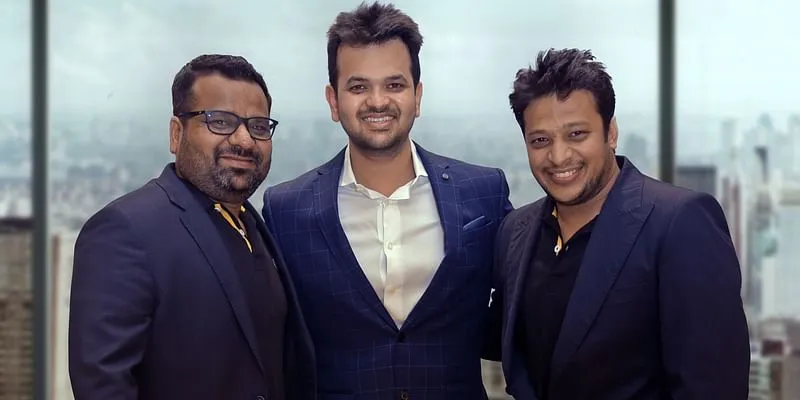SaaS logistics startup FarEye CEO on the inside story of nailing a $100M funding round as it eyes becoming a global category leader
Kushal Nahata, Co-founder and CEO of FarEye, tells YourStory, the inside story of raising a whopping $100 million Series E round from TCV and Dragoneer Investment Group.
“If you ask me, ‘did you plan to raise $100 million?’, I would say when we started the process we didn't. It’s just that for those partners I was okay if it meant extra dilution. What I wanted was to have really good people on board who can help the company grow.”
Kushal Nahata, Co-founder and CEO of , tells YourStory, shortly after the logistics SaaS startup raised a whopping $100 million Series E round from TCV and Dragoneer Investment Group.
To be clear, when FarEye co-founders Kushal, Gaurav Srivastava, and Gautam Joshi met TCV and Dragoneer, they were really not looking for any investment. They hadn’t even prepared a deck. It was just a great initial conversation with the partners, which is why the co-founders were keen for the team to also meet with the investors.
The result: a $100 million Series E funding round led by marquee investors that have backed category-leading companies globally.

FarEye Founders (L-R): Gautam Kumar, Gaurav Srivastava, Kushal Nahata
“If you have a look at the portfolio of TCV, you will see companies like Netflix, Airbnb, and Spotify, which are all category-leading companies. So they believe in category leaders. With Dragoneer, what I loved was they were looking at us as an API to last; so when you need help, we are there, and it's such a great feeling,” says Kushal.
No wonder then that for the FarEye team — which has built a low code, intelligent, predictive logistics SaaS platform working to make deliveries efficient for industries across retail, manufacturing, and transport, and logistics — the backing from these venerable names was a clear validation of their mission to meet a gap in the global logistics market and be a category creator in the space.
“This is a new category and there is no established leader. So when you (have investors) coming to invest and when you hear from the customers and analysts, and you realise the level of transparency we have…all this brings in the belief that we are actually on the journey to position ourselves as a global leader in this category and I believe that worked for us,” Kushal tells YourStory Founder and CEO Shradha Sharma.
With more than 150 customers, including global logistics firm DHL, retail giant Walmart, health and home care products company Amway, and pizza and restaurant chain Dominos, among others, FarEye is empowering global enterprises across 30 countries to shrink delivery time by up to 27 percent, increase courier productivity by up to 15 percent, eliminate risks by up to 57 percent, and ensure operational excellence.
Indeed, Kushal believes the opportunity for SaaS startups in India is ripe for the taking. He believes the SaaS boom in India has only just started, making this an interesting space for both startups and investors to explore.
Now growth and expansion on cards
Going forward, FarEye believes the capital raised will enable it to more aggressively target its ambition of becoming the number one platform and eyeing a larger market share in global markets, including scaling in Europe and the US.
“You want to get into that global leadership position and be that number one platform. That’s where you can get more aggressive here. I want to get a larger market share within a one-year to two-year period and that is one big reason for the need of capital versus going the little longer route,” says Kushal.
Kushal highlights that before raising funds, the company already had enough gross margins to survive and grow.
“The only question here is, “can we achieve the growth that would’ve typically taken five to seven years in just three years?” So, money is essentially a fuel but it's not the vehicle or driver. If you have extra fuel, you can drive at an accelerated pace. And as you scale in markets like Europe and the US, I think the capital helps you to go a little more aggressive,” he adds.

FarEye: Building the core culture
Here are some practices FarEye followed that act as foundation pillars that accelerated the journey of the founders and the growth of their startup.
Everyone needs to add value
As Kushal describes it, daily boardroom meetings at FarEye start with company updates, growth achieved, learnings, more on an informational basis. The team later moves to thoughts and suggestions and slowly gets into a mode where every person is adding value towards increasing the efficiency and productivity of the company.
“So everyone is coming with a mindset to add something to what’s existing in the company. Maybe more introductions, hirings, strategic partnerships, governance, experience, marketing, policies...There are so many areas right, and then we use the same deck and share with the team as well to build transparency and encourage ideas and opinions. That just changes the game, ” he adds.
Authenticity and transparency is the key
Kushal believes that if one has the confidence that whatever the other person is saying is authentic or honest, then people start focusing on the actual problem at hand.
“If you have that confidence here about me that I have been authentic or honest to you about me, then you will not evaluate me through what I am saying. You will try to analyse and help. Otherwise a lot of time we're wasting time in just trying to understand the motives behind the conversation,” he says.
Accepting your mistakes
For Kushal, it is important for people to understand and own their mistakes.
“If you are facing challenges, come and tell, these three things are not working for me and these are the three I can do well. Mistakes are acceptable, as long as we are learning from them,” he adds.
Finding a balance
Building a global company from scratch across 12 years is a big milestone and Kushal Nahata has achieved that successfully. In this journey, there are many new perspectives which he builds but one that he believes is the most crucial is the balance between team and family.
“Passion and goals are important, but people around you are important too. In your tryst to build your dream, sometimes you take your family and loved ones for granted. Team becomes more important than family. But the key is to balance it out well,” he concludes.
Edited by Tenzin Pema









